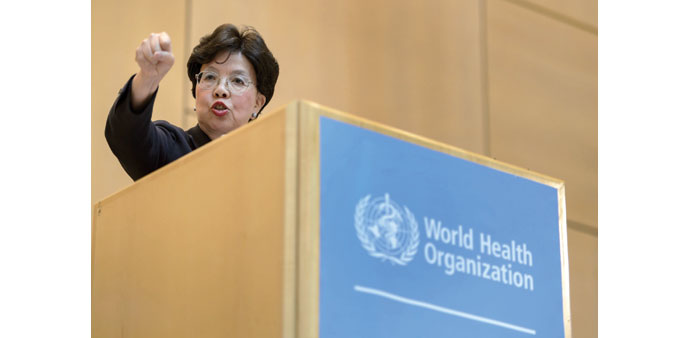AFP/Reuters
Geneva
The World Health Organisation (WHO) will dramatically reform its emergency response operations this year, its chief said yesterday, after the UN agency faced blistering criticism for its slow Ebola response.
WHO Director-General Margaret Chan told the agency’s decision-making body in Geneva that she had decided to make some “fundamental changes” to help the organisation respond more quickly and efficiently in times of crisis.
“I do not ever again want to see this organisation faced with a situation it is not prepared, staffed, funded or administratively set up to manage,” Chan told some 3,000 delegates from 180 countries gathered for the annual World Health Assembly.
The WHO has faced a barrage of criticism for responding far too slowly to the west African Ebola outbreak, which since it began in late December 2013 has infected nearly 26,800 people and killed more than 11,000 of them.
“The world was ill-prepared to respond to an outbreak that was so widespread, so severe, so sustained and so complex,” Chan said.
She acknowledged that the WHO had been “overwhelmed” by the outbreak, which had placed demands on the organisation that were “more than 10 times greater than ever experienced in (its) 70-year history”.
The WHO today has nearly 1,000 staff on the ground in Ebola-ravaged Guinea, Sierra Leone and Liberia.
Chan said that WHO staff would remain in the three countries “until the job, including the recovery of (their devastated) essential health services, is done”.
To ensure that the agency will be better prepared next time disaster strikes, Chan said she had called for the creation of a $100mn contingency fund, “financed by flexible voluntary contributions”, to ensure money will be available to respond immediately.
The WHO will also establish a joint programme for health emergencies, which will report directly to Chan, and which will include clear performance metrics “showing what must happen within 24, 48 and 72 hours, not months”, she said.
The new programme will also co-ordinate a new global health emergency workforce, called for during a rare emergency session of the WHO’s executive board in January, she said.
The skills of the WHO’s emergency staff will also be boosted with the addition of logisticians, medical anthropologists and experts in risk communication, Chan said.
Shoddy communication and a lack of understanding of the traditions and customs of people living in local communities has been blamed for widespread community resistance to efforts to isolate patients and ensure safe burials of highly infectuous bodies, which slowed down the fight against the virus and even opened some aid workers up to attack.
The reforms will not come cheap.
Chan has proposed a 10% hike in the 2016-17 budget, bringing it to $4.4bn, with $236mn going towards the WHO’s surveillance and response capabilities.
“The Ebola outbreak shook this organisation to its core,” she said, but she added she hoped the reforms would help give the WHO “new relevance and empower it to lead in global health”.
“I plan to complete these changes by the end of the year,” Chan said.
Asked later by a reporter whether she had considered resigning or had been asked to, she replied: “The answer is no. Nobody ever asked me. The buck stops with me. As a responsible leader you need to learn lessons and make the right changes.”
Earlier, German Chancellor Angela Merkel told the WHO’s 194 member states that the organisation must streamline management to respond quickly to crises like the “Ebola catastrophe”.
“We ought to have reacted far earlier,” the chancellor said. “I am convinced that if we act faster and have a clear command structure in place, we will be better equipped to combat a crisis like Ebola next time that happens.”
“The WHO is the only international organisation that has universal political legitimacy on global health issues. This is why it is so important to render its structures more efficient,” she added.

Chan: I do not ever again want to see this organisation faced with a situation it is not prepared, staffed, funded or administratively set up to manag
